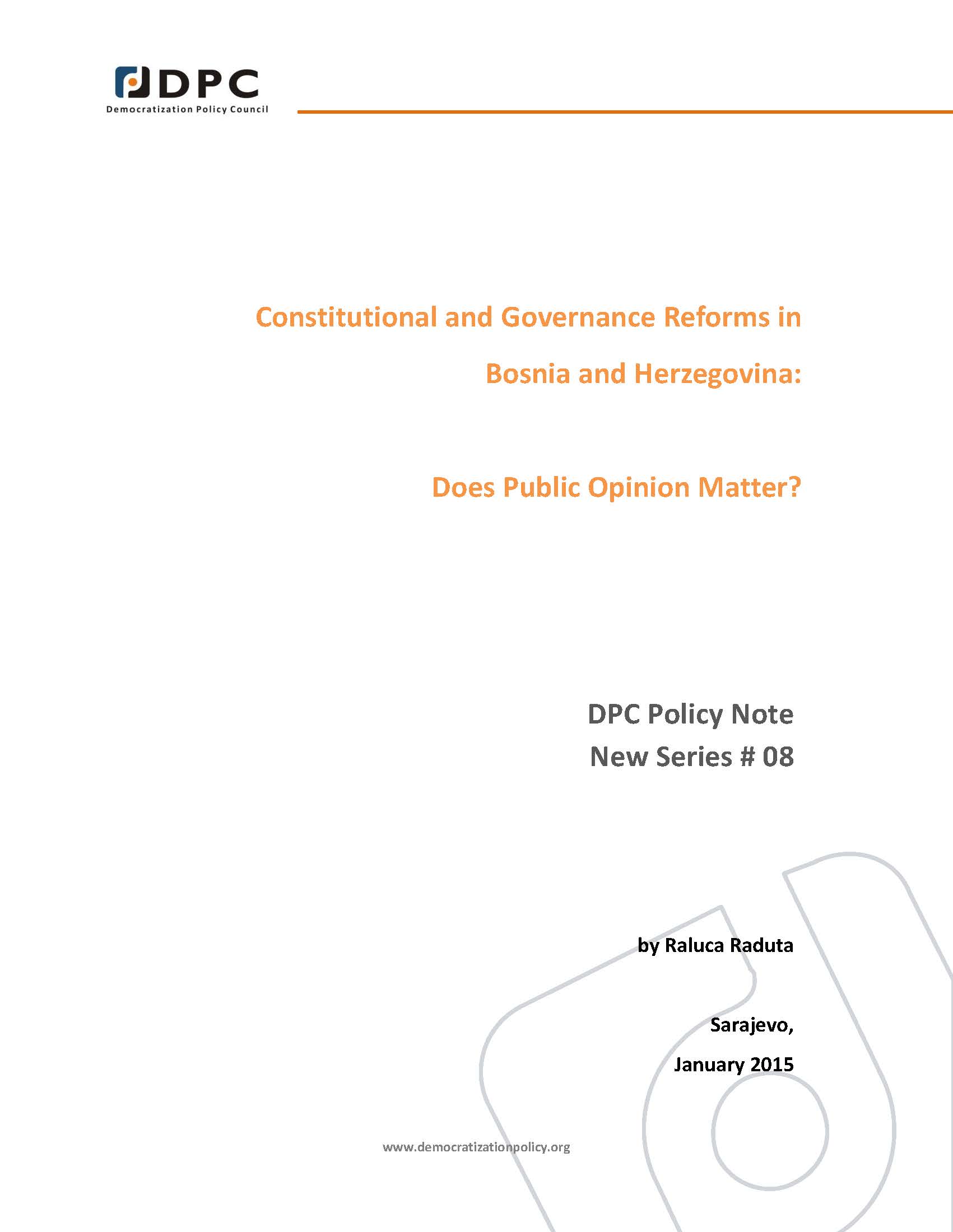DPC POLICY NOTE 08: Constitutional and Governance Reforms in Bosnia and Herzegovina: Does Public Opinion Matter?
DPC POLICY NOTE 08: Constitutional and Governance Reforms in Bosnia and Herzegovina: Does Public Opinion Matter?
Author(s): Raluca Raduta
Subject(s): Constitutional Law, Governance, Inter-Ethnic Relations
Published by: DPC Democratization Policy Council e.V.
Keywords: BiH; constitution; governance; reform; public opinion; ethnicity;
Summary/Abstract: The past two years in Bosnia and Herzegovina (BiH) were punctuated by episodes of unprecedented popular activism. Major flooding in central and northern BiH demonstrated government lack of preparedness and incompetence at all levels. These events coincided with the failure of efforts to obtain one particular constitutional change: implementation of the European Court of Human Rights’ (ECtHR) ruling in the Sejdić-Finci case. The positions of BiH political leaders on structural questions have been clear – and entrenched. Yet little attention has been paid, both by local political actors and the international community, to what citizens of the country actually think as to how outstanding structural impediments to accountability and functionality, manifest in BiH’s constitutional order, can be addressed. This paper analyzes results of seven recent polls, undertaken mostly in the past two years, to identify areas of popular agreement on discrete elements which should be addressed in BiH’s constitutional structure. This analysis allows for an overall view on trends over time and across themes. It also reduces the risk of selective data and manipulated answers being touted as expressions of citizens’ interests. The aggregate results demonstrate far more popular appetite for confronting outstanding problems through the constitutional structure than is evident at either the local or international political level – 88% in the aggregate in 2013, including nearly 80% of RS respondents, for example. Citizens understand that this would allow them to live as in a “normal country” with functioning governance, facilitate confidence-building and reconciliation, and be a prerequisite to integration into the EU. Numerous responses on sectoral priorities defy conventional wisdom – and current policies. Corruption consistently topped the list of identified popular concerns, with it being explicitly linked to the economic situation in most of the polls assessed. Justice is seen as among the most corrupted elements of governance, this corruption also being manifest in political influence. Nearly 8 in 10 citizens – including more than 6 in 10 Serbs – surveyed believe corruption needed to be investigated and adjudicated at the state-level. An overwhelming majority of BiH citizens of all stripes agree that agriculture should be among the elements of constitutional reform – with more than 60% (including a plurality of RS Serbs) believing this should be a state competence. Furthermore, nearly 80% of respondents stated that EU laws should trump domestic law, giving the EU potential leverage in its reform efforts, should it mobilize a popular constituency. The analysis of the surveys shows that the differences among respondent groups are narrow and are decreasing over time, as all citizens grow more dissatisfied with politics and politicians. There are few differences across entities and ethnicities when it comes to burning issues such as corruption, the economic crisis, political representation and justice.
Series: DEM. POLICY COUNCIL - Press-Contributions
- Page Count: 23
- Publication Year: 2015
- Language: English
- Content File-PDF

